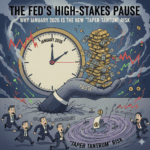The Securities and Exchange Board of India (SEBI) recently announced several regulatory updates, including changes to the delisting framework, adjustments to futures and options (F&O) inclusion criteria, and new restrictions on financial influencers (finfluencers). These changes aim to create a more equitable and secure market environment.
Revised Delisting Framework: Easier Path for Promoters
SEBI has simplified the delisting process, providing promoters with a fair opportunity to take their companies private. The regulator has introduced a fixed price process for voluntary delisting, allowing promoters to buy back all public shares at a minimum of 15% premium to the “fair price.” This is in addition to the existing Reverse Book Building (RBB) process, which remains stringent as it often results in high delisting prices.
In a significant change, Sebi has reduced the threshold for the counter-offer mechanism from 90% of public shareholders to 75%. Under the RBB process, delisting is successful if the promoter’s post-offer shareholding reaches 90%. Sebi chairperson Madhabi Puri Buch stressed the need to facilitate companies to exit the market, comparing it to avoiding a “Hotel California” scenario where “you can check in whenever you want, but you can never leave.”
Updated Criteria for F&O Inclusion
SEBI has revised the eligibility criteria for inclusion and exclusion of stocks in the F&O segment. The new parameters include average quarter sigma order size, market-wide position limits and average daily delivery price. These adjustments are aimed at ensuring that only liquid stocks are traded in the F&O segment. As a result, the number of stocks in the F&O segment is expected to increase slightly from the current 182, with about two dozen stocks likely to be included and removed.
Clamping Down on Errant Finfluencers
To curb the influence of unauthorized financial advisors, SEBI has barred regulated entities and individuals from associating with anyone providing direct or indirect stock recommendations or claiming guaranteed returns. However, regulated entities can collaborate with finfluencers focused on investor education without offering advice.
Enhancements in Market Regulation
SEBI’s board has approved several other regulatory measures:
University Funds Exemption: University funds and endowments are now exempt from additional disclosure requirements for foreign portfolio investors (FPIs).
Debt Securities Issuance: The public issue process for debt securities and non-convertible redeemable preference shares has been eased.
Infrastructure Investment Trusts (InvITs): The trading lot for privately placed InvITs has been reduced to ₹25 lakh.
Investment Advisers and Research Analysts: A new fee collection mechanism is proposed for registered investment advisers (IAs) and research analysts (RAs).
Market Infrastructure Institutions (MIIs): An independent external evaluation of stock exchanges and other MIIs’ performance will be conducted every three years. Additionally, SEBI has removed the automatic financial disincentive for managing directors and chief technology officers of MIIs due to technical glitches, following feedback that the disincentive hampered talent attraction and retention.
Alternative Investment Funds (AIFs): SEBI has limited the extension of a large value fund’s tenure to five years, subject to majority unit holders’ approval. AIFs can now borrow for up to 30 days to address temporary shortfalls in drawdown.
Strengthening Cybersecurity and Data Localization
To enhance market security, SEBI has mandated data classification and localization for regulated entities, ensuring robust security controls for regulatory data. The regulator has also approved a cybersecurity and cyber resilience framework to safeguard the market infrastructure.
Conclusion
SEBI’s recent regulatory changes are designed to foster a more transparent, efficient, and secure market environment. By easing delisting rules, updating F&O criteria, and imposing stricter controls on financial influencers, SEBI aims to protect investors and maintain market integrity. The new measures, including exemptions for university funds and enhanced cybersecurity protocols, reflect SEBI’s commitment to evolving with the market’s needs and ensuring sustainable growth.















